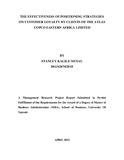| dc.description.abstract | The study was set out to determine the effectiveness of positioning strategies on customer loyalty as perceived by customers of Atlas Copco Eastern Africa Limited. The objectives of the study were to establish the effectiveness of positioning strategies on customer loyalty as perceived by the customers as well as find out the challenges the clients face as result of the positioning strategies used by the firm. The research adopted the descriptive survey research design while the sampling design adopted was the quota sampling design. The total population was 500 customers and a sample of 100 customers was drawn using the quota sampling design representing 25% of the customer base. A structured questionnaire was used to collect data. The method of data collection was mainly through electronic mail and personal visits. The response rate was 71%. Questionnaires were coded and edited for completeness using the Statistical Package for Social Services (SPSS). The data collected in section I was analyzed using frequencies and percentages while that in section II was analyzed mean and percentages to determine the effect of the positioning strategies used by Alas Copco its customer loyalty. All quantitative data was descriptively analyzed using SPSS. Qualitative analysis was only carried on those aspects of the data that were quantifiable. The findings are presented in form of tables and percentages or means obtained quantitatively.
The research was able to determine that staff competence in handling the customers topped at 94% as among the reasons customer prefer Atlas Copco products and services followed by staff skills at 68% and concern for safety at 48%. Staff competence and
skills, which are among the expanded variables of benefits and attributes positioning, had the greatest effect on customer loyalty with a score of 4.27 as shown in table 4.2. Based on the research findings, a number of challenges were identified key among them stringent terms of payment where 29% of the customer sampled noted, lack of decentralized services at 21% and frequency of stock outs at 11%. It is worth noting that the company can convert the challenges faced by the customers into opportunities as suggested in Chapter five. This may include entering into long term service agreements and thereby having relaxed payment terms such as quarterly payments instead of advance payments; further the company can propose rental services during planned maintenance programmes and during unplanned plant shutdowns. The company may utilize the study as a first way of determining which locations to set up local centres for handling customers who are far away from the regional centre in Nairobi, Mombasa and Kisumu. Finally, the findings in this study support the arguments put forth by Batra, Myers and Aaker (1996) who see the most used positioning as the one of the association of an object with the product characteristics and customer benefits. | en |

